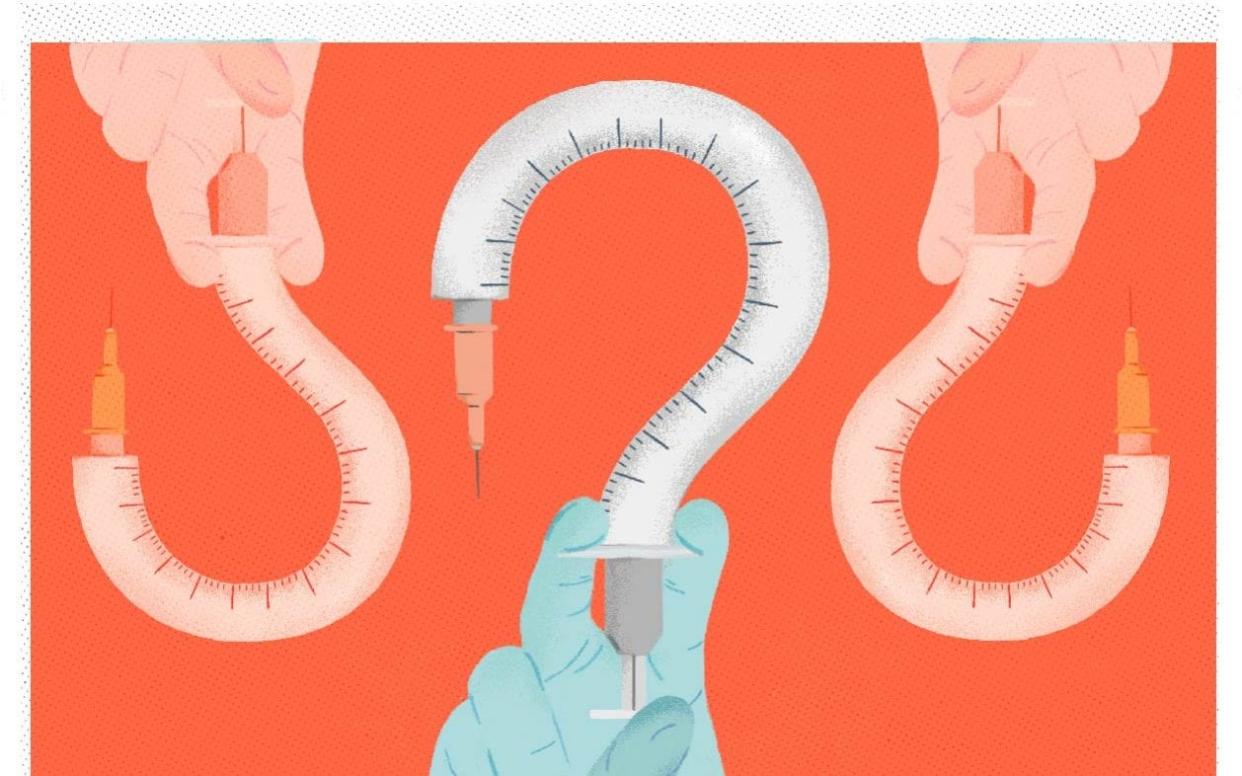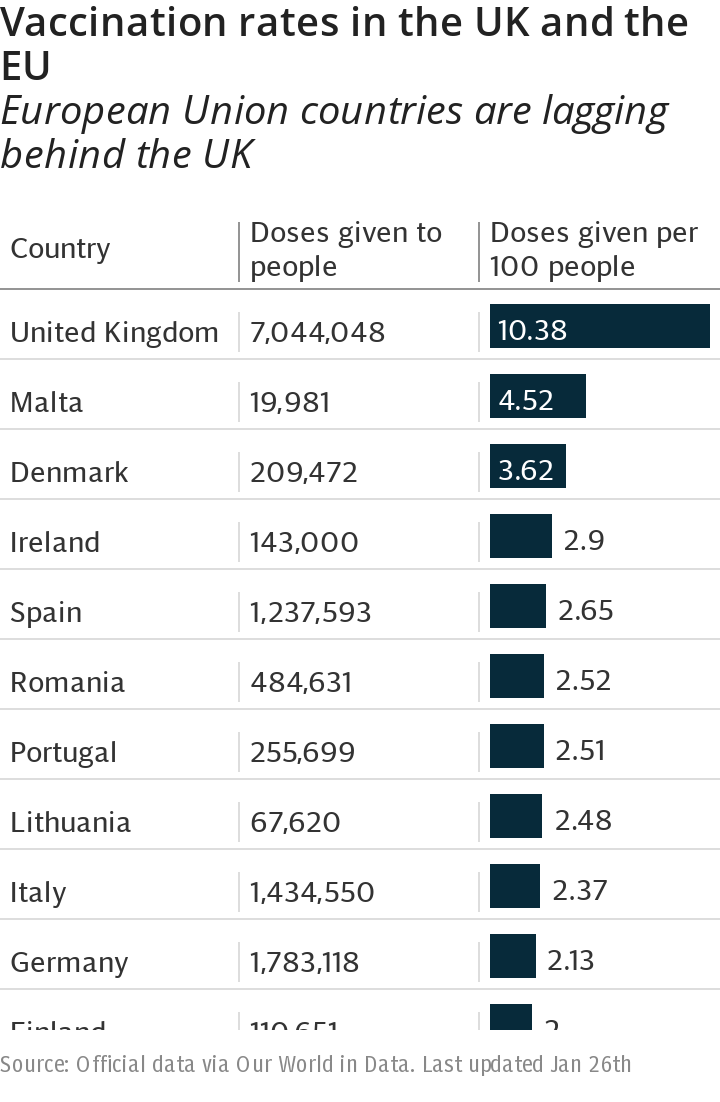Some women are scared about the Covid vaccine harming their fertility – should they be?

It took Laura Jenkins over six-and-a-half years to conceive her son. It’s why she’s concerned about having the Covid vaccine when her time eventually comes.
Laura, 31, a PR consultant from Maidstone in Kent, would love a second baby but is worried about the effect the vaccine may have on her already fragile fertility.
“Those years of failing to get pregnant were very emotionally distressing,” she says. “It was a case of unexplained infertility, but having the vaccine before trying for another baby is scary. My husband and I are now seriously thinking of trying to get pregnant sooner than we’d planned.”
Laura is not alone in her concerns, with many women taking to social media to share similar thoughts, or confiding in friends and family. They are not part of the anti-vaxx movement and do ultimately want to have the vaccine. But they are seeking reassurance that the Covid jabs - developed and approved much faster than would usually be the case - won’t impact their fertility.
For some, their concerns were sparked by the initial government guidance published for healthcare professionals in early December 2020, when the Pfizer vaccine was approved, stating: ‘It is unknown whether Covid-19 mRNA Vaccine BNT162b2 has an impact on fertility.'
The vaccine hadn’t tested in pregnancy – the norm in most medical trials – and until more information became available, pregnant women were advised not to routinely have it and to avoid pregnancy for two months following it.
The impact of this cautious approach has been wide-sweeping.
A survey of 55,000 Britons by Find Out Now on December 29, discovered that the group most likely to refuse the vaccine was 18 to 34-year-old women, with many citing worries about fertility. More than a quarter said that they wouldn’t take it (at that point, the only available option was Pfizer, with the Oxford vaccine approved on December 30).

It didn’t help that, in November, false stories started circulating on social media, claiming that the ‘head of Pfizer research’ – a man named Michael Yeadon, who it later transpired hadn’t worked for the company for more than nine years - had called the Pfizer vaccine, “female sterilisation.”
The claims were debunked but Angelica Malin, an author and small business owner who lives in north London, was scared off. She turns 30 this week and won’t have the vaccine until she’s been reassured it won’t affect her fertility.
“I’m single and I’ve been thinking of freezing my eggs for a while,” she says. “When I saw the panic spreading on social media about the effect on fertility, I now want to freeze my eggs sooner and give myself the best chance of having children, before having the vaccine. I just worry it hasn’t been tested enough.”
At the beginning of January, however, the guidance from Public Health England changed, stating: ‘The early Covid-19 vaccines do not contain organisms that can multiply in the body, so they cannot infect an unborn baby in the womb.’
Evidence reviewed so far by the UK Medical and Healthcare products Regulatory Agency (MHRA) has raised no concerns over safety in pregnancy and The Joint Committee on Vaccination and Immunisation (JCVI) even recognised the potential benefits of vaccination as particularly important for some pregnant women – those in the Covid high risk or vulnerable categories.
Dr Victoria Male a lecturer in reproductive immunology at Imperial College in London, has looked at the science behind the vaccine and says there is no reason to believe it will impact a woman’s fertility.
“When the vaccine was first approved, the guidance was extremely cautious because it hadn’t been tested on pregnant women,” she says. “Since then, a study published by Pfizer on December 10 - which vaccinated pregnant rats, and rats who later became pregnant - revealed there was no impact on the rats themselves or their babies.
“This evidence shows there is no cause for concern when it comes to the affect on human fertility. Add to this the fact that during phase 3 trials conducted last year by Pfizer, 23 women participating became pregnant by accident, and safety is looking more certain.”
Crucially, there are risks involved in not having the vaccine and getting infected with Covid while pregnant.
“In the first trimester, pregnant women with Covid don’t do any worse,” says Dr Male. “But in the third trimester, Covid puts a lot of pressure on the heart and lungs, which are already under pressure from pregnancy. Although we can’t cure the Covid, we can relieve the pressure by delivering the baby earlier, which means a premature baby is a more likely outcome – not ideally how you’d want to start a family.”

Like Dr Male, Beate Kampmann, Professor of Paediatric Infection and Immunity and Director at the London School of Hygiene and Tropical Medicine, believes there’s nothing to suggest the Covid vaccines will negatively affect a woman’s chances of conceiving.
“If you’re thinking of conceiving, the main issue in theory would be that there could be ingredients in a vaccine that would hang around and could potentially have an effect on the developing foetus,” explains Professor Kampmann.
“But in the context of the Covid vaccines, there is no biological plausibility for this - as the mRNA in the vaccine is degraded very quickly and the protein that’s made doesn’t go anywhere near the reproductive organs.”
Professor Kampmann agrees that the recommendations have been confusing in the UK and women should understand that vaccines are a good thing - especially if the condition or disease being prevented could have severe effects on the mother-to-be or baby.
“Pregnant women are routinely inoculated against seasonal flu because they have worse outcomes and they’re also highly recommended to have a vaccine for whooping cough as antibodies come through the placenta, protecting the baby before it gets its own jabs,” she adds.
On deciding whether to have the Covid vaccine during pregnancy, Professor Kampmann advises talking to your doctor and midwife, and weighing up your own risk of exposure to the virus and additional risk factors.
“Those who have hypertension, a large BMI or lung issues will be inclined to have the vaccine more rapidly. Otherwise, in the absence of a broader set of safety data, I’d wait until after having your 20 week scan as a precaution,” she says. “It’s essential to capture information from women who had the vaccine to get more data, as pregnant women weren’t included in the trials, and while we believe it’s safe, we need to enhance the evidence of safe practice to reassure more women.”
It’s handy, then, that most women of childbearing age are unlikely to be listed for the vaccine until the late summer/early autumn.
“The more time that passes, the more data about the vaccine’s safety we can collect,” says Professor Kampmann. “After all, this virus is going to be with us for some time.”

